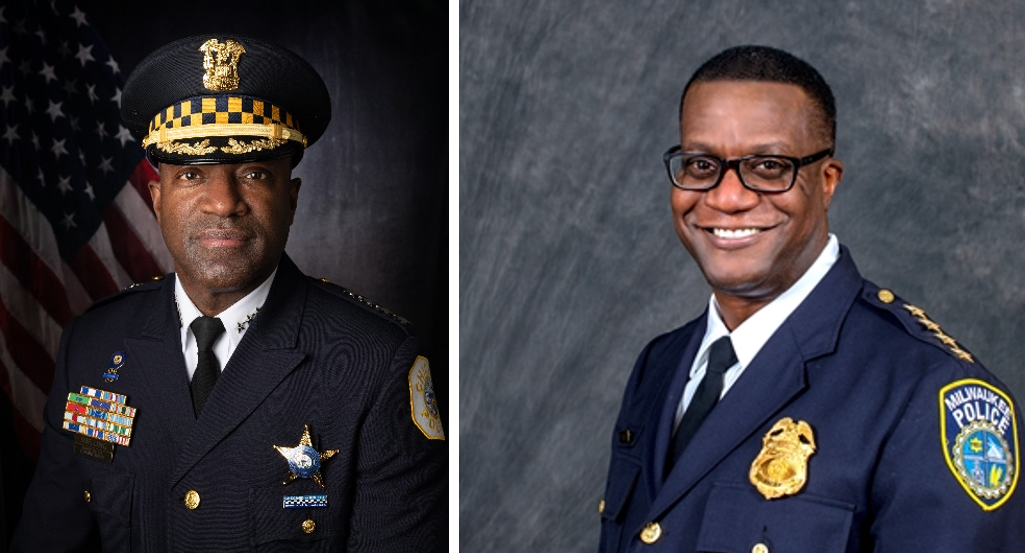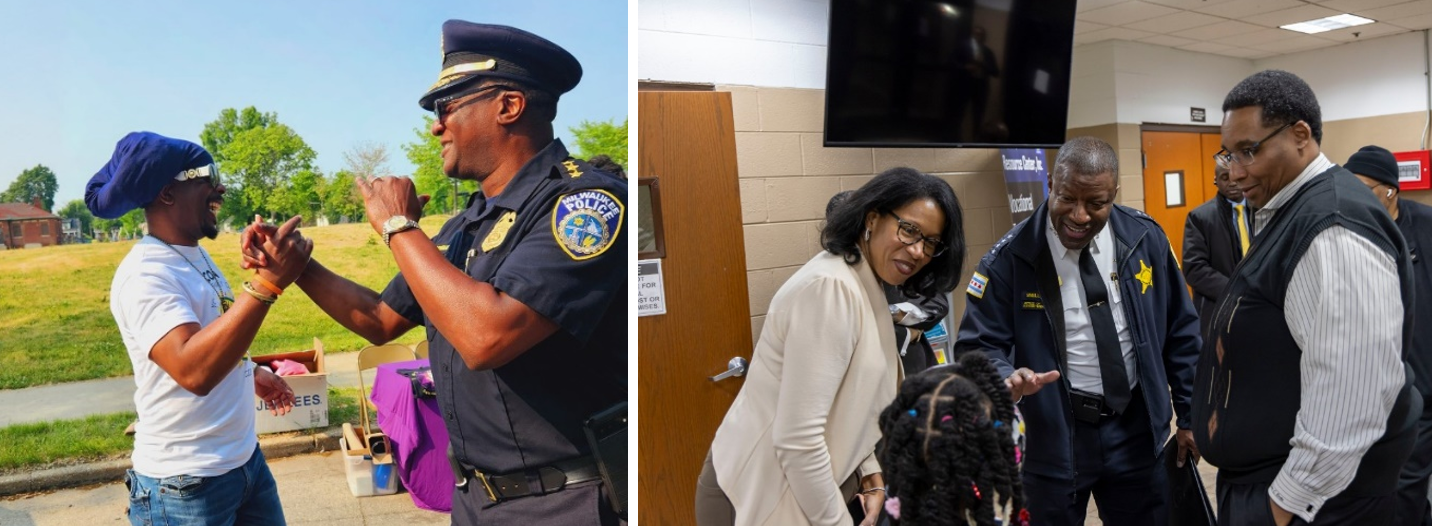|
March 30, 2024 Chicago Superintendent Larry Snelling and Milwaukee Chief Jeffrey Norman discuss preparations for this summer’s political conventions
PERF members, Here in the United States, we’re well into the leadup to the 2024 presidential election, and I expect things will heat up during this summer’s political conventions. The Republican National Convention will take place on July 15-18 in Milwaukee, and the Democratic National Convention will follow a month later, on August 19-22, in Chicago. This week I spoke with Milwaukee Police Chief Jeffrey Norman and Chicago Police Superintendent Larry Snelling about their agencies’ preparations for these events.
Chicago Superintendent Larry Snelling (L) and Milwaukee Chief Jeffrey Norman (R) Chuck Wexler: How do events elsewhere in the country inform your preparations for these conventions? Chief Jeffrey Norman: For these types of events, there’s nothing new. It’s important for us to be aware of any trends, but safety is safety. There’s a lot of hubbub about preparing for the RNC, but no one was talking about how challenging preparations were for the 2021 NBA Finals, when we had over 100,000 people packed into a little area, the Deer District, that was open air and accessible to anyone with ill intent. So there is a level of attention on us from national and international media, but the challenges of public safety – securing areas, utilizing resources from multiple departments – are all the same. It’s just about making sure you’re conveying a level of competence and reassuring the public that we’re doing everything we can to make this event and our city safe. We’ve seen events like the Boston Marathon bombing and the mass shooting in Las Vegas. There are real challenges posed by those who have ill intent. You always have to be thinking outside the box, learning, looking at best practices, and communicating with other chiefs, because we have each other to lean on. Wexler: Superintendent Snelling, the RNC in Milwaukee will happen before the DNC in Chicago. Will you send people to Milwaukee to learn from their experience? Superintendent Larry Snelling: Yes, and we’re also working through our federal partners to make sure we have communication between Milwaukee and Chicago, because we know that we’re going to be helping each other out. We’re always willing to pick up new ideas and bring them back to Chicago. We did something similar when preparing to host the 2012 NATO summit. We visited cities that had hosted similar events to find out best practices. And we looked at past events where things went wrong, including in our own city. We put these lessons into place, and it made our NATO event a success. To answer your question about events elsewhere, there are factors in play now that were not in play during previous events. We know there’s an uptick in protests, especially with the conflict in the Middle East. Here in Chicago, we’ve had a pretty good handle on making sure the protests don’t get out of hand. And people in the protests have been pretty cooperative. So we haven’t seen anything major here. But we’re preparing for everything, because we don’t know who is coming here. We’re training our officers. Everything we do is rooted in the First and Fourth Amendments. We’re working closely with our federal partners, who will handle the inside perimeter. We’ll handle everything outside the convention center, and we’re ready. I like to keep a positive attitude about these things, because I know our officers are ready to step up. We’ll get this done, and we’ll come out on the other side feeling good about how we responded. Wexler: The Chicago Police Department has far more resources than the Milwaukee Police Department. Chief Norman, will Milwaukee need more mutual aid than Chicago? Chief Norman: Absolutely, but when you have a friend, you’re never alone. We’ve built relationships through organizations like PERF and the Major Cities Chiefs Association, and a lot of people are helping because of the relationships we’ve built and nurtured over the years. We’re also working with the Major County Sheriffs of America and our state chiefs’ and sheriffs’ associations. So we’re not having any issue recruiting help. But I want the right officers coming into our city. I want individuals who understand what it means to deal with the public and have patience when dealing with those who want to exercise their First Amendment rights. If they’re not willing to listen to me and what we need here in this city, they should stay home. Critical situations will be staffed by Milwaukee officers or one of our close partners from Wisconsin. We need our out-of-state partners for other roles, because there will be so many events. It’s important to have a method to how this will all operate. Wexler: Superintendent Snelling, will it be challenging to police all your neighborhoods when you need to have so many officers downtown? Superintendent Snelling: It’ll be challenging, but you have to be strategic. We definitely don’t want to deplete the neighborhoods, because people are depending on our officers to feel safe in those communities, especially marginalized communities. So we need manpower there. During that time, there will be extended days and cancelled days off, but officers will have plenty of notice to make sure they can make arrangements for their families. Part of the strategy is making sure officers can get around. During NATO, we found it was effective to have officers on bikes. Those officers can get to a location quicker and manage a crowd if needed. That gives us a mobile group of officers who can move from place to place and aren’t just on foot. We’re training our officers to respond in a specific way. When we bring in people from outside agencies, it’s better to place them in areas that are not as volatile. They can free up some of our officers who are trained to respond to these incidents. Wexler: How do you prepare differently than you did 5 or 10 years ago? Superintendent Snelling: We even have to prepare differently than four years ago. We look at what happened during the 2020 riots and learned a lot from that. There is far greater use of social media now. People can form up in a matter of minutes just by communicating through social media, and they can communicate in an encrypted manner. We know what we’ve seen in the past. We’ve done after-action reports, and we need to make sure we’ve reviewed them, thought about them, and created training and planning to make sure we avoid previous problems. Wexler: Where will you be during the conventions? How do you think about your role while events are occurring? Superintendent Snelling: I’ve always believed in being present anywhere I’m needed. I’ll assess each day and see what we have going on. You get an intelligence briefing, and based on that briefing, you want to be available wherever it may be necessary for you to make tough decisions. And I think it’s very important for your officers to see you, because everything trickles from the top down. Whatever message is coming from me, I want it to get out to our officers. And I want to be visible to those officers to let them know that I’m out there with them. I think we often forget that those officers are human beings. There are times we have to worry about fatigue because of the hours they’re working, and they may be undernourished or dehydrated. All those things can affect an officer cognitively, and they can affect the officer’s response. Now, there are times when I’ll have to go to the command center and take a look at what’s going on across the entire city to make a proper assessment of what needs to be done next. So I don’t think there’s just one place where I’ll need to be. This is a huge city, and things are going on all over. I’m concerned about what’s going on with the Democratic National Convention, but I’m more concerned about what’s going on with the city as a whole. Because when the DNC leaves, our people are still here. So I have to be concerned about the safety of my communities. We’re not just serving the DNC; we’re serving everybody. So I’ll be all over the city. And maybe the day after the DNC, I’ll get to sleep. Chief Norman: Larry said everything I wanted to say, and it’s all true. It’s important that people see you, not only at the event but in the rest of the city. As the face of the department, I’ll be expected at the formal events, but you also want to be out there for the boots on the ground who are out there engaging with people. I remember when we had individuals out there working 16- to 20-hour days during the 2020 protests. As a commander, I was working 16- to 20-hour days just to be with the troops, because it’s important for them to see that leadership and to manage by walking around. It’s important to check in at the emergency operations center, not only for the event, but for the rest of the city. Our residents want to be reassured that they’re not going to be forgotten. They want to be assured that there’s a level of vigilance for everything, because that’s what we’re responsible for: the safety of our city. Wexler: How do you think about delegating decision-making during events like this? What decisions do you need to make yourself? Chief Norman: It’s a fine line. You’re in the top job to make decisions. But you want to empower your people to make decisions and be responsible for those decisions unless you need to step in. You always hold the trump card to intervene when you see things are not going the right way. As leaders, we have to be thinking 5-6 steps ahead about what may occur. I always tell my team not to rush to act unless the situation dictates it. You know when you have an emergency situation, but otherwise you have to use the time on your hands and slow it down. Superintendent Snelling: Empowering your people is very important. When you put people in charge of things, you have to trust that those people are carrying out your plan. You also have to trust that when they have to call an audible, they’re making a strategic decision. Those boots on the ground will sometimes force you into calling an audible. “We know what the plan is, but we didn’t account for this particular situation. So we’re going to regroup and come up with another plan.” If you have someone there who you know has experience with this type of situation and has planned for this, then you know you have someone who’s going to make a decent decision. In the end, even if that person makes a decision and it didn’t turn out like they expected, you trust them enough to understand that they made the best decision they could at the time. So if you put that trust in people, they will make those tough strategic decisions and do what they believe is right. Then you have to support them.
Chief Norman (L) and Superintendent Snelling (R) meeting with community members We will further discuss election-related issues at the PERF Annual Meeting in Orlando on May 29-31. Have a wonderful weekend! Best, Chuck |


